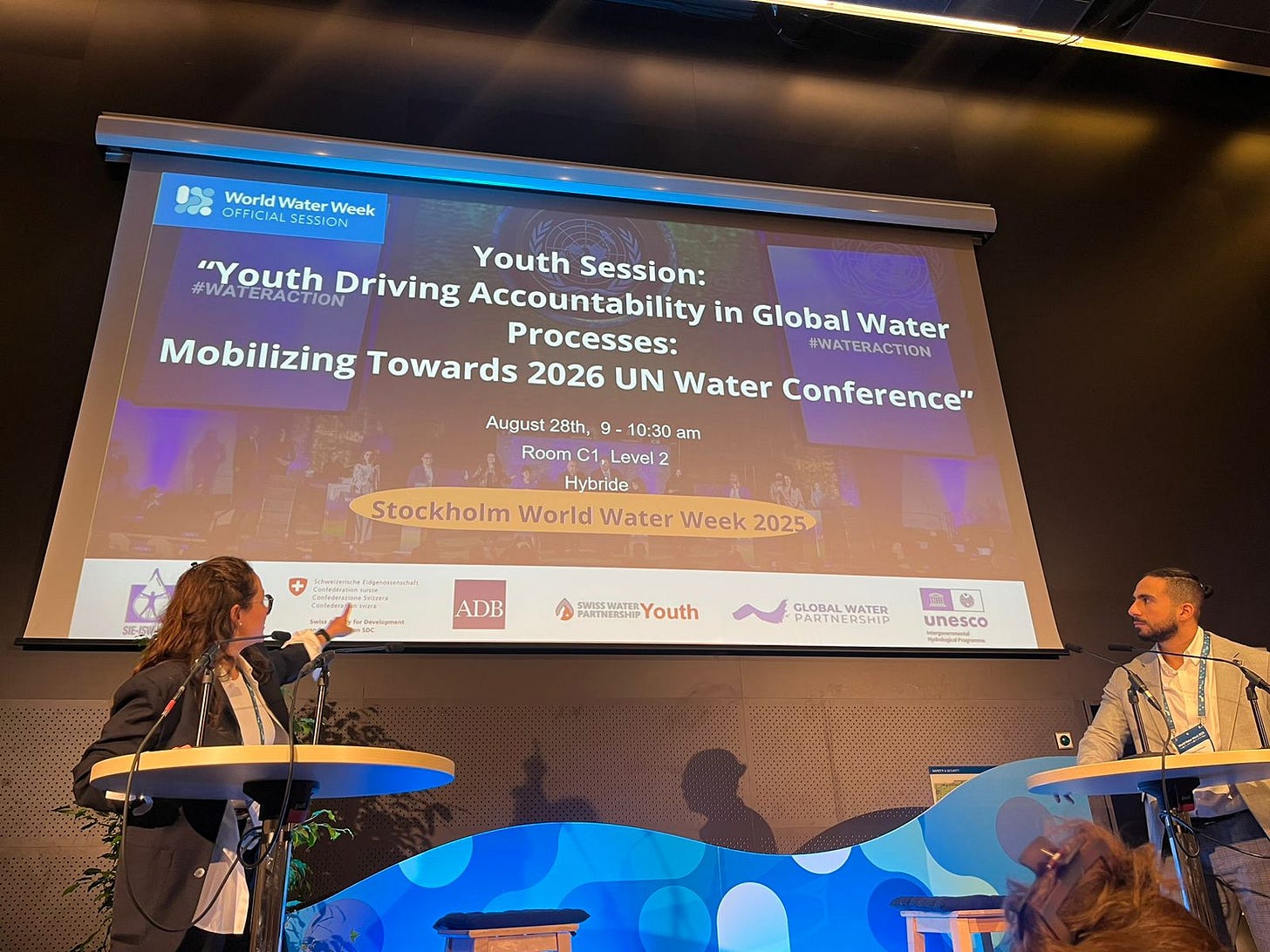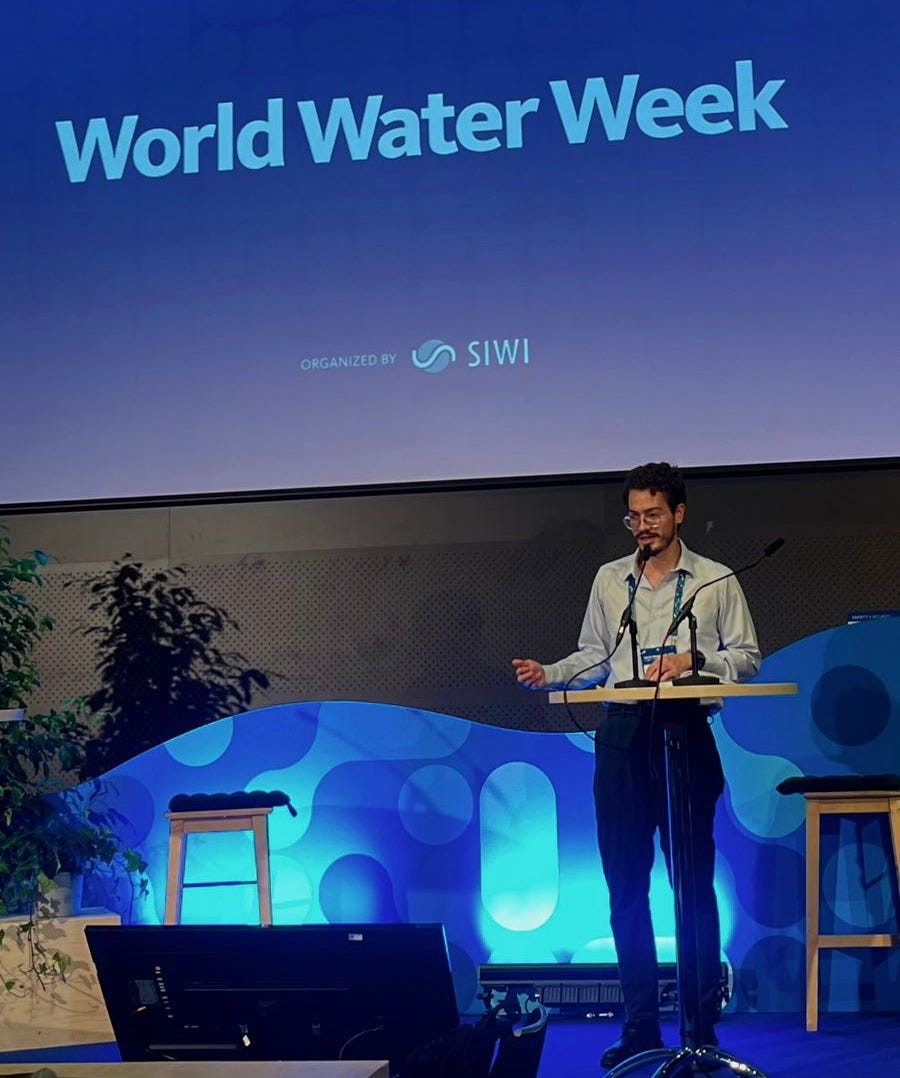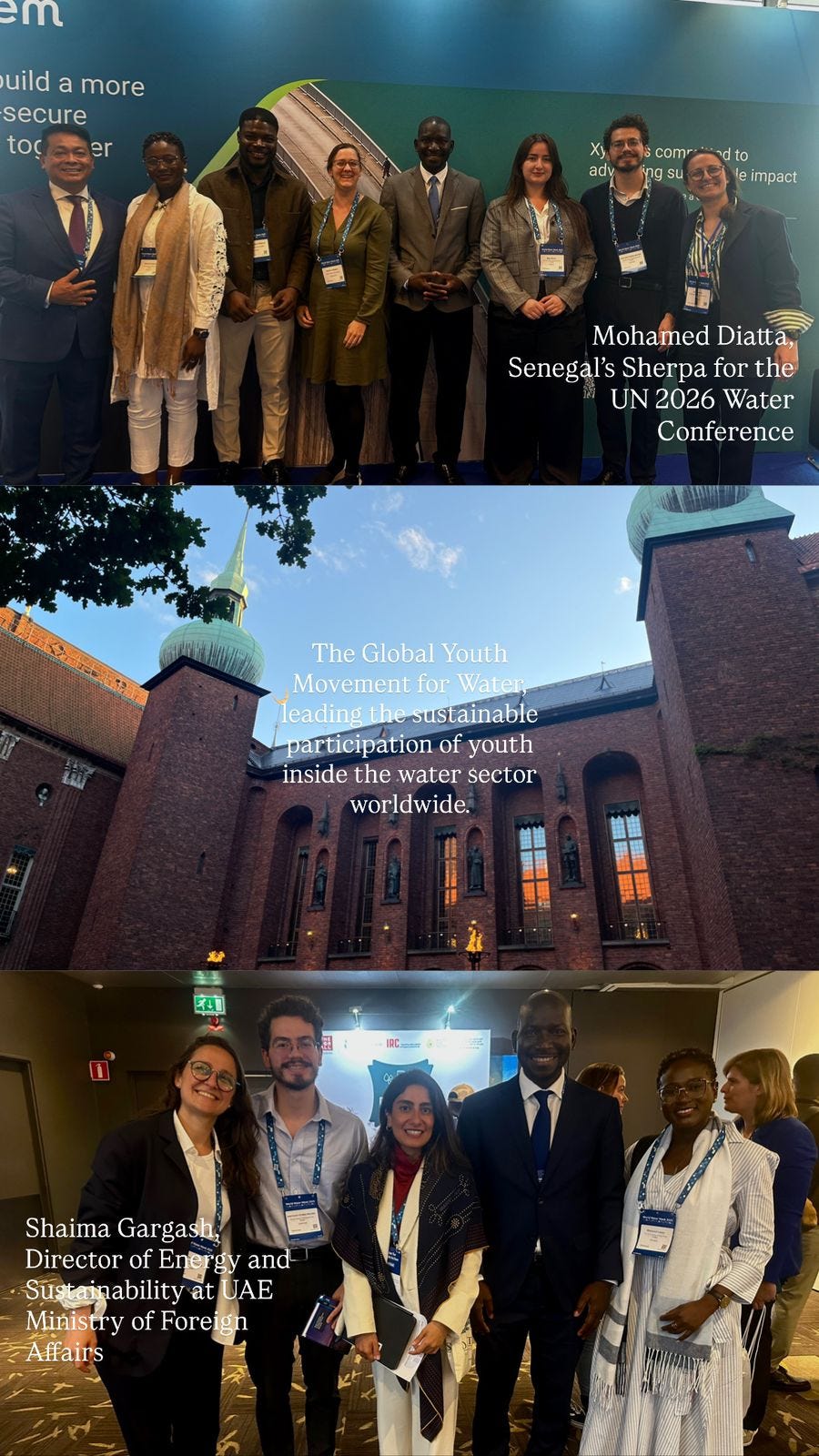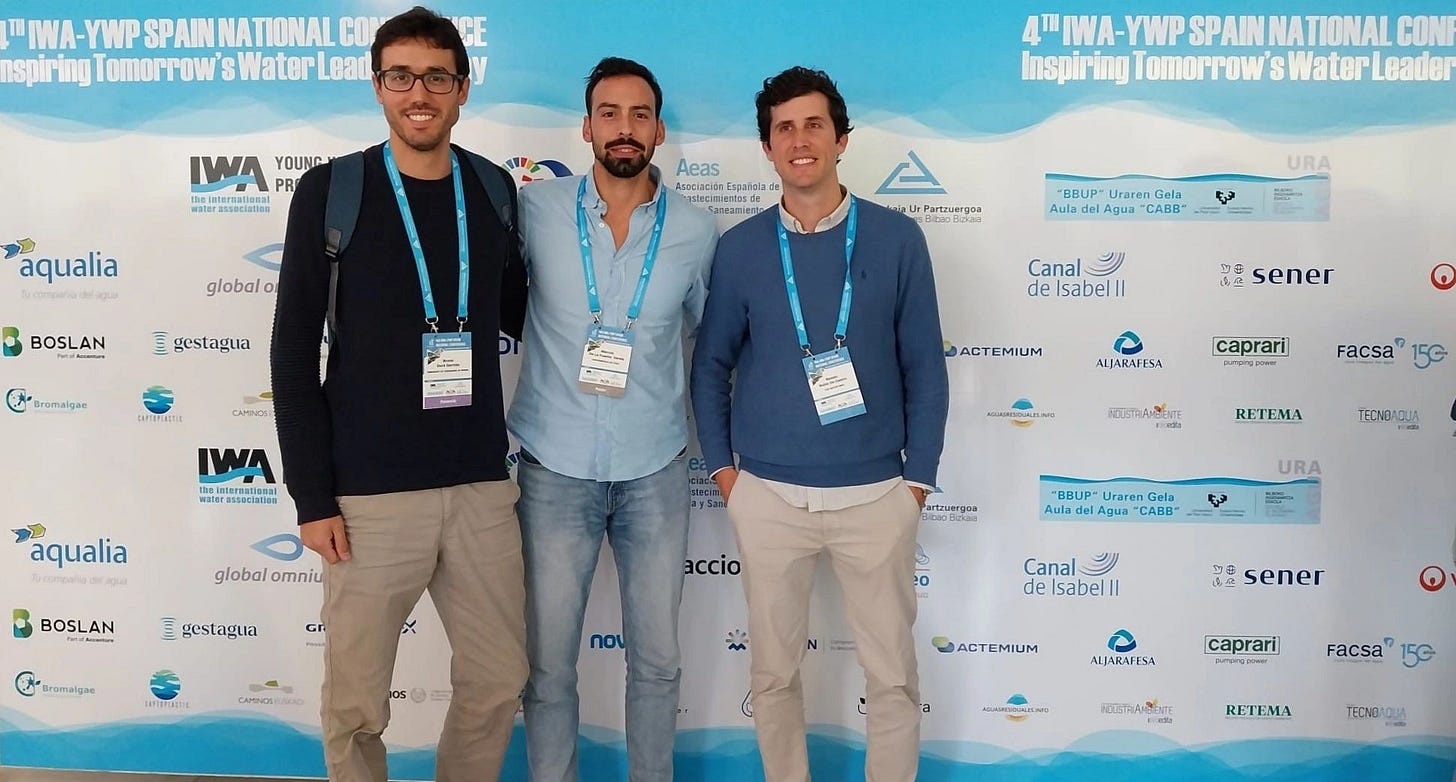The youth movement in water.
Water, youth, and governance: key insights for Latin America and the Caribbean.
Santiago Gomez, a civil engineer from Cali, Colombia, has long been passionate about water.
This edition is proudly sponsored by… myself. 😊
Just a friendly reminder: there’s a small window for sponsorships (in case anyone is interested!).
I’ve already received about another 2 requests, and I truly appreciate the immense value that sponsorship will bring, helping us unlock new features and upgrade the experience in future editions.
If you’d like to explore sponsorship opportunities, here’s the link. Your support helps us grow and create even more value for everyone.
After studying Civil Engineering at the University of Los Andes in Bogotá, he began his career focused on urban hydraulics, aqueduct design, and developing courses on proper water and sanitation project structuring with the Inter-American Development Bank in Colombia.
Early on, he noticed a gap, not in expertise, but in engaging young people in solving the world’s water challenges.
That realization led him to the Global Youth Movement for Water (GYMW), where he now works to ensure that young voices are heard in water management globally.
Within this framework, Santiago helped launch the Latin American and Caribbean chapter, born from the observation that the region’s unique water challenges were often overlooked at international forums, such as the World Water Conference in Bali.
The chapter’s mission is clear: foster collaboration, share knowledge, and amplify the voices of young water professionals across Latin America and the Caribbean.
Santiago highlighted six main problems identified in Latin America and the Caribbean:
• Poor water management and inequality: Despite water abundance in many areas, management is often unequal, leading to situations where access to potable tap water varies drastically even within short distances, such as in Colombia.
• Lack of universal access to water and sanitation: A significant portion of the population, like 30% in Peru, lacks access to drinking water, which is a contradiction given the region's water resources.
• Insufficient water governance and under-investment in security: The region often focuses on hydraulic infrastructure (aqueducts and sewers) rather than protecting water sources and applying nature-based solutions, leading to vulnerability.
• Intermittency and lack of guaranteed supply: Climate phenomena are causing intermittent water flows in networks, highlighting a failure to guarantee water security.
• Unsustainable water use and operational inefficiencies: A staggering 20-40% of transported water in Latin America is lost due to poor management and operational deficiencies, often exacerbated by a lack of regulation.
• Climate risks and lack of integrated planning: Planning often assumes constant water availability, failing to account for future climate change impacts on water infrastructure and resources.
Santiago emphasized that youth must be an integral part of addressing these issues, urging for a shift in perspective.
He noted that water has become "like new gold," stressing the importance of overcoming ignorance about its value and ensuring its proper governance.
He also advocated for new investment models, beyond traditional tariff-based approaches, to finance treatment plants and protect ecosystems, inviting private sector and development bank involvement.
For those interested in joining the movement, Santiago explained that it operates on a volunteer basis, requiring passion and dedication.
He stressed that they welcome individuals from diverse backgrounds, not just civil engineers, as the water challenge is complex and requires varied expertise.
The journey ahead is long, but Santiago remains optimistic, believing that sustained effort and new approaches, coupled with the energy of young people, will lead to a water-secure future for all.
Youth at World Water Week
A few weeks ago, our esteemed guest joined World Water Week.
Jet lag aside, the experience was inspiring, from sharing his perspectives to meeting influential leaders shaping the upcoming UN Water Conference.
World Youth Parliament for Water
A few months ago, our episode with Marta Zaragoza introduced this topic. Back then, I sensed the momentum building and wanted to learn more.
Marta Zaragoza, an influential voice from the World Youth Parliament for Water (WYPW), shared a compelling story of transformative youth engagement in the global water sector.
She begins with the WYPW, a vast network of young water professionals and activists spanning over 80 countries with more than 50 active chapters, boasting a diverse membership from social sciences to STEM.
Historically, the water sector was plagued by fragmentation and a generational gap, often leading to youth underrepresentation, tokenistic inclusion, and a lack of support in decision-making.
A significant shift occurred with the launch of the Global Youth Movement for Water (GYMW) at the 9th World Water Forum in Senegal in 2022.
This movement united hundreds of youth-led organizations, fostering collaboration over competition.
Marta herself was at the forefront of this change, notably negotiating on behalf of the Bali Youth Plan Working Group for the declaration to be adopted at the upcoming forum.
This accreditation as an observer in political negotiations marked a "very, very big step", signaling a recognition of youth competence and new expertise, not just age.
To ensure tangible progress and accountability, the "30-30-30 Youth Target" was introduced at the UN Water Conference in New York.
This initiative aims for 30% of participants in international, national, and local water events to be under 30 years old by 2030.
Marta also highlighted the critical theme of "Water and Peace" (or "blue peace"), emphasizing water's role as a vector for cooperation, rather than conflict, especially in the face of climate change.
Ultimately, Marta's message underscored the indispensable value of intergenerational dialogue and collaboration.
Young people, she stressed, are not just the future but the present, bringing innovative solutions and diverse perspectives.
It is crucial to include historically marginalized communities, who often possess invaluable local knowledge, and to continuously strive for a water-secure world through sustained effort and collaboration
LAC Chapter
The Latin American and Caribbean chapter of the World Youth Parliament for Water was born from a crucial realization during the World Water Forum in Bali: a significant need to amplify the region's voice and address its unique, often overlooked water problems.
Santiago and his colleagues observed a lack of communication among water professionals in the region, despite many dedicated individuals.
Collaborating with the International Water Association, they established this regional chapter in October, creating a foundational document that compiles perspectives and proposes solutions from young people across Latin America
Young Water Professionals (IWA)
One of our favourite episodes was our conversation with Stephanie Aparicio from Young Water Professionals Spain.
I also had the chance to attend the Young Water Professionals Spain IV National Congress in Bilbao in October 2024, and the experience was simply outstanding.
Beyond meeting wonderful people and making new friends, I was impressed by the high level of expertise among many professionals.
For example, our episodes with young water members such as Ana Juárez, on flooding and hydrology, and with María Cardenal from Bluetech Research, on the market potential and case studies of water reuse, also stand out among our favourites.
Stephanie Paricio shared the compelling story of the organization dedicated to bridging the generational gap and fostering young talent in the water sector.
The initiative was born out of the International Water Association's (IWA) recognition that the water sector was aging and struggling to attract young people.
Stephanie emphasized that the organization is driven by a "love of water" and operates with a horizontal, non-pyramidal structure, ensuring that all members who contribute receive visibility and recognition.
The only requirement to join is to be under 35 years old and submit a letter of motivation.
Looking ahead, Stephanie expressed a personal goal of increasing public dissemination about the importance of water, explaining complex issues like climate change impacts and wastewater treatment in an accessible way to a broader audience.
And next year, we hope to see the launch of the I Spain–Latin America and Caribbean International Youth Congress. It will be the perfect opportunity to bring our young Spanish community together in person. Don’t miss it!
Not everything shines
As I’ve mentioned in other essays, since March 2025 I’ve had the opportunity to launch the Young Water Professionals (YWP) community group in my region, Andalucía.
The purpose is simple: to bring together a small group of passionate young professionals so they can stay connected, organize events, network, and visit facilities to keep learning and growing.
But the reality has been challenging.
It is extremely difficult to gain support from public and political institutions.
I’ve reached out, called, and even met with some representatives, yet after months, we have not progressed much, but I see some light at the end of the tunnel, so stay tuned for the updates…
All we want is to get involved, to understand how things work, and to contribute with a perspective that looks beyond the short 4–8 year political cycles.
I’ve also encountered Companies that refused to promote the YWP initiative among their young talent, fearing that those professionals might grow, explore new opportunities, and eventually leave.
To me, this reflects an old-school mindset.
Talent shouldn’t be retained by fear. It should be uplifted.
The traditional approach of “study, work 9–5, retire” no longer applies.
The new way forward is about empowering people, helping them grow, and trusting that by doing so, both individuals and organizations thrive.
Youth support
I believe each of us has a responsibility to support, guide, and uplift the young professionals who truly want to make a positive impact in the water sector.
That support shouldn’t be occasional, it must be continuous, meaningful, and designed to bring them fully on board.
At The Water MBA, this platform is open to any young professional eager to engage: whether by sharing knowledge, contributing ideas, or even stepping up as a founding member to represent the youth vision that is so essential for our future.
What’s left for Unfiltered?
I’ll be complementing this article with additional insights in our monthly Unfiltered section, available to our paid members.
There, I’ll dive deeper into the Youth Water Strategy.
I’ll explore its missions, barriers, and priorities, giving you a clearer picture of how young professionals are shaping the future of water governance worldwide.





